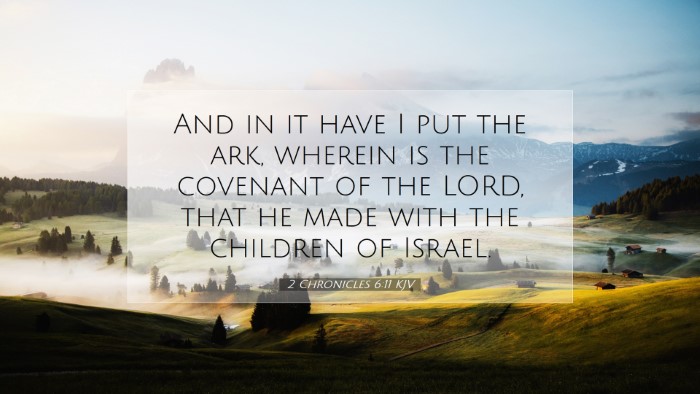Commentary on 2 Chronicles 6:11
2 Chronicles 6:11 presents a significant moment in the history of Israel, encapsulating the dedication of Solomon's temple and the presence of the Ark of the Covenant within it. This verse reads:
"And in it (the temple) was the ark of the covenant of the Lord; the ark had in it the two tablets which Moses put there at Horeb, when the Lord made a covenant with the children of Israel, when they came out of Egypt."
It serves as a crucial reminder of God's promises and the importance of the covenant relationship between God and His people.
The Context of 2 Chronicles 6
This chapter is a part of Solomon's prayer of dedication for the temple. The historical context is essential as it encapsulates a transition in Israel's worship practices from the mobile tabernacle to a permanent temple, symbolizing stability and the enduring presence of God among His people. The temple represents not only a physical structure but also the spiritual relationship between God and Israel.
Significance of the Ark of the Covenant
The Ark of the Covenant was the most sacred object for the Israelites. It was a symbol of God’s presence and His covenant with Israel. As noted by Matthew Henry, the Ark contains the tablets of the Law, which represent the moral and ethical guidelines set forth by God for His people. This emphasizes the notion that the covenant is founded upon obedience to God's law.
-
Symbol of God's Presence: The Ark is described as being in the innermost part of the temple, indicating that God's presence dwells closely among His people. Henry elaborates on this by suggesting that the more we understand the sanctity of the temple, the more we appreciate God’s desire to be with His people.
-
Historical Covenant: The mention of the two tablets emphasizes their historical and theological importance. Adam Clarke states that these tablets symbolize the unbroken nature of God's covenant despite Israel’s frequent unfaithfulness.
-
Memory of Deliverance: The reference to Horeb points to a crucial moment of divine revelation and redemption. Albert Barnes highlights that this moment is a reminder of God’s faithfulness since the time of the Exodus, urging the contemporary church to remember their deliverance.
Theological Implications
The theological implications of this verse extend far beyond the historical context. The Ark as a representation of God's covenant could suggest several key doctrinal themes:
- Covenantal Faithfulness: The presence of the Ark serves to remind the Israelites of their obligations under the covenant. This echoed the call for faithfulness and commitment to God.
- God's Sovereignty: The establishment of the temple and the Ark’s placement within it signify God's sovereign dominion over Israel and their history.
- Hope and Promise: The Ark’s enduring presence becomes a symbol of hope for future generations, reflecting God’s unchanging nature and His promises, making it particularly relevant for pastoral applications today.
Instruction for Worship
The dedication of the temple and the presence of the Ark instruct the people on how worship should be conducted:
- Worship should be centered on God's promises, as highlighted by the contents of the Ark.
- Worship involves remembering God's past acts and covenant rituals, fostering continuity in tradition.
- Worship flows from a heart of gratitude and respect towards God, as shown in Solomon's prayer.
Exhortations to the Modern Church
For pastors, students, and theologians, this verse provides rich material for exhortation and practical application in the modern church context:
-
Revival of Covenant Awareness: Just as Israel was reminded of their covenant, today’s believers must be reacquainted with their identity in Christ as a covenant people.
-
Call to Faithfulness: This verse reminds the church of the commitment required in our relationship with God. The narrative invites believers to reflect on their faithfulness and their adherence to God's word.
-
Hope in God’s Promise: The assurance of God’s presence should instill hope amidst the struggles of life and challenges faced by the church today.
Conclusion
In summary, 2 Chronicles 6:11 is not merely a historical account but serves as a theological touchstone for understanding the nature of God’s relationship with His people. It urges believers to remember God’s covenant faithfulness, recognize the profound significance of worship, and draw hope from the enduring presence of the Lord. As we study this passage, may we be moved to deeper faith and commitment in our walk with God, drawing lessons from the past to inform our future.


